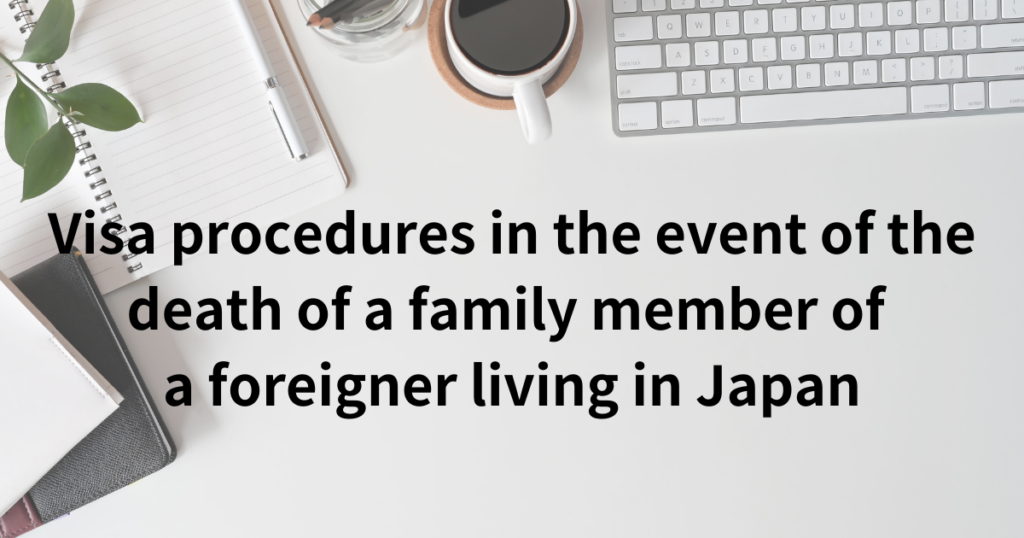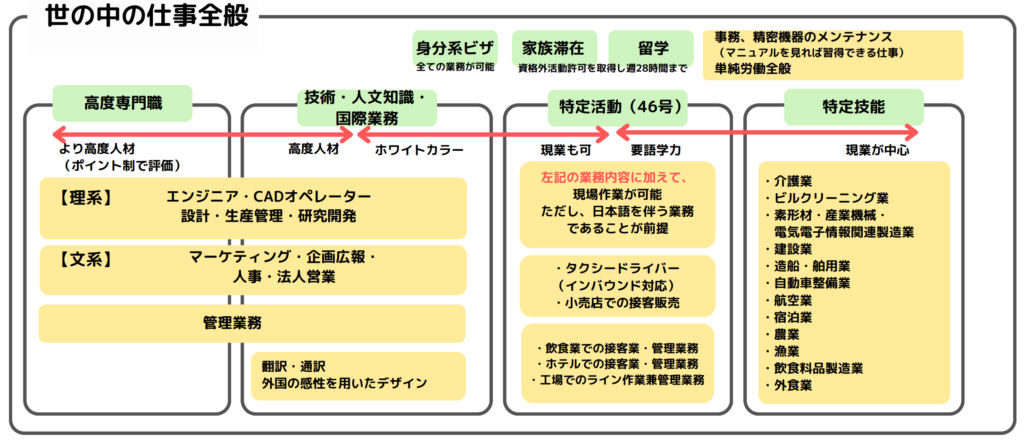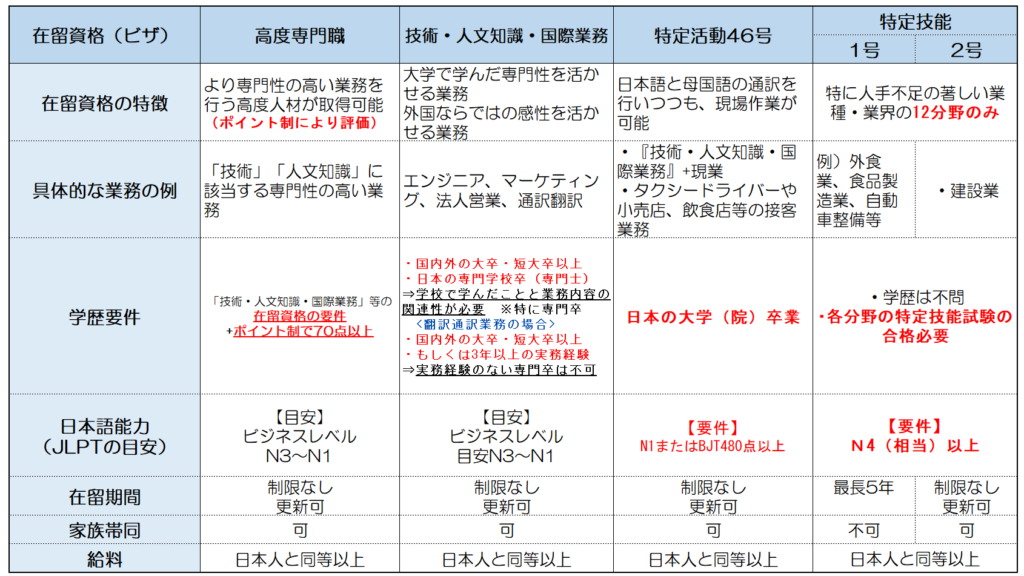
When a family member of a foreign national living under the status of “Spouse or Child of Japanese National”(日本人の配偶者等), “Permanent Resident” (永住者)or “Dependent”(家族滞在) passes away, there are procedures to be carried out at the Immigration Service Agency. Although these procedures are carried out at a very sad time, they are necessary in order to continue living in Japan.
The following is a summary of the procedures to be taken at the Immigration Service Agency in the event of the death of a foreign family member living in Japan.
Procedures at Immigration Service Agency in the event of the death of a family member of foreign nationality living in Japan.

There are two procedures to be carried out at the Immigration Service Agency as a result of having “died”: the procedure “about having died” and “the change of status of residence (visa)”.
There are three procedures to follow at Immigration Service Agency as a result of the death of a family member.
When a family member of a foreigner living in Japan dies, “return of residence card” is carried out in the event of the foreigner’s death. In addition, if a foreigner has obtained status of residence by reason of marriage (e.g. ‘Spouse or Child of Japanese National’, ‘Permanent Resident’ or ‘Family Dependent’), a ‘Notification of Spouse’(配偶者に関する届出) is required and if the foreigner wishes to continue living in Japan, a ‘Change of Status of Residence’(在留資格の変更) is required.
Return of residence cards of deceased family members (in the case of foreigners).
If the deceased family member is a foreigner, the residence card of the deceased must be returned to the Immigration Service Agency. When returning the card, it must be returned within 14 days of the date of death. At this time, the ‘death certificate’ should also be submitted together.
▶Immigration Service Agency:「Return of residence card, etc.」
Submit a ‘notification of spouse’ within two weeks of the date of death.
If a person who has obtained status of residence on the grounds of marriage (e.g. ‘Spouse or Child of Japanese National’, ‘Permanent Resident’, ‘Dependent’) divorces or bereaves his/her spouse (wife/husband), he/she has to submit a ‘Notification of Spouse’ to the Immigration Service Agency within 14 days of the divorce or bereavement.If 14 days have passed, it is not too late to submit the notification now. If you are planning to change your status of residence in order to continue living in Japan in the future, not submitting this notification will have a negative impact on your examination.Make sure to submit it.
Change of status of residence also required within a set time limit
The ‘spouse of a permanent resident’, ‘spouse of a Japanese national’ and ‘Dependent’ (family-based ‘designated activities’ similar to Dependent) are all statuses of residence (visas) based on the premise of living together as a couple or as a family.
Therefore, in the event of bereavement of a spouse (wife/husband), the basic rule is to change to another status of residence (visa) or leave Japan within a set period of time.
The set period is, in principle, up to six months for ‘Spouse or Child of a Permanent Resident’ and ‘Spouse or Child of a Japanese National’, and up to three months for ‘Dependent’ (and family-related designated activities similar to Dependent).
It is unlikely that you will be summoned to the Immigration Service Agency for even one day past the period(three months in the case of ‘Dependent’ or six months in the case of ‘Spouse or Child of a Permanent Resident’). However, if you change your status of residence after the period, in many cases the immigration authorities will ask you why, or it may have a negative impact on your application.
However, even if a person remarries in Japan, there is no need to change status of residence if a person residing under the status of ‘spouse or child of Japanese national’ remarries a ‘Japanese national’ or a person residing under the status of ‘spouse or child of permanent resident’ remarries a ‘permanent resident’.Details will be explained later.
Supplementary information: procedures for death itself
When a foreigner residing in Japan dies, a notification of death is submitted to the municipal office within seven days. At this time, if you wish to bury the body in Japan, submit an Application for Issuance of a Cremation and Burial Permit for a Corpse, and cremate the body after receiving permission.
If you wish to transfer the body or remains from Japan to a foreign country, please consult your Embassy and Consulates in Japan for instructions.
Can I live in Japan after my family member dies?

Whether or not you need to go through procedures at the Immigration Service Agency as a result of ‘bereavement’ with a family member depends on your status of residence (visa). The idea is that if the reason for obtaining status of residence was ‘marriage’, you need to go through the procedure, but if you obtained status of residence for other reasons, you need to return the deceased’s residence card, but you do not need to go through the procedure for change of status of residence due to bereavement or submit a ‘notification of spouse’.
Family status, such as “Spouse or Child of a Permanent Resident”, “Spouse or Child of a Japanese National”, “Dependent”, etc.
Family statuses such as ‘Spouse or Child of a Permanent Resident’, ‘Spouse or Child of a Japanese National’, ‘Dependent’ (family based ‘Designated Activities’ similar to Dependent) require reporting and procedures to the Immigration Service Agency.
The necessary procedure is to make a ‘notification of spouse’ within 14 days of the death, and to apply for permission to change status of residence within a set period of time if you wish to continue your stay without returning home.
Work-related status, such as ‘Permanent Resident'(「永住者」), ‘Engineer/Specialist in Humanities/International Services'(「技術・人文知識・国際業務」), ‘Highly skilled professional'(「高度専門職」), etc.
‘Permanent residents’, including, for example, those who have married a ‘Japanese’ or ‘permanent resident’ and have become ‘permanent residents’ within a short period of time due to relaxed requirements, do not need to notify or change their visa.
If you have been in a work-related status, such as ‘Engineer/Specialist in Humanities/International Services’ or ‘Highly Skilled Professional’, you do not need to notify the authorities or change your visa.
Status of residence (visa) after divorce, which should I change to?

In the event of bereavement of a spouse (wife/husband)those living on a family-based visa status cannot stay in Japan as it is, so a change of status of residence (visa) is considered.Consider a work visa if you have found a job, a family visa if you have remarried, or a Long Term Resident visa if there are circumstances that require you to remain in Japan.
If you are (or will be) employed, a work visa
If you are employed, or if you are not employed and considering employment to earn a living, consider a work-based residence status.
If you are a salaried employee and receive a salary, the categories ‘Engineer/Specialist in Humanities/International Services'(「技術・人文知識・国際業務」), ‘Skilled Labor’ (「技能」)and ‘Specially Skilled Worker 1′(「特定技能1号」) apply, while if you start your own business, the category ‘Business Manager’ (「経営・管理」)and other statuses of residence (visa) apply. If you are a particularly outstanding person, you may be eligible to apply for “Highly Skilled Professional 1″(「高度専門職1号」) status. Each status of residence has different academic and professional background requirements and a different range of possible work activities. Below is an example of a commonly obtained work visa.


If you remarry, select a family visa.
It is possible under the system to remarry within a set period (3 months or 6 months) and change to another family visa.
In this case, the status of residence to apply for will depend on the nationality and status of residence of the remarried partner. For example, if your second marriage partner is Japanese, you will remain a “spouse or child of a Japanese national” and do not need to apply for a new status of residence until the next renewal of your visa. If you are married to a permanent resident, you will consider for “Spouse or Child of Permanent Resident”(「永住者の配偶者等」) status, and if you are married to someone with a work visa, you will consider for “Dependent“(「家族滞在」) or “Designated Activities” (「特定活動」) status. In this case, there are a few points to note.
First, of course, a sham marriage solely for the purpose of residence is not recognized. Not only remarriages, but also applications for status of residence from marriages of two people who have been together for a short period of time tend to be scrutinized more strictly; in the case of a remarriage of less than 3 or 6 months, it is easier to be suspected of a sham marriage, so please be careful. In addition, Japan has a waiting period for remarriage under the Civil Code (as of July 2023), which also applies to foreigners who marry in Japan. Please check carefully as a marriage visa is applied for after marriage.
Those who have previously resided in Japan as the “spouse or child of a permanent resident” should be careful. If the visa status you wish to change is ‘Dependent’, unlike ‘Spouse or Child of Japanese National’, there are restrictions on working because it is assumed that you will live within your partner’s dependent . If you obtain a ‘Permission to Engage in Activity other than that Permitted under the Status of Residence Previously Granted'(「資格外活動許可」), you will be able to work part-time up to 28 hours per week, but if you have been working full-time, it will be difficult to continue working as before.
If you have other circumstances that require you to remain in Japan (Long Term Resident)
For example, if you have been married in Japan for a long time and have no family or job back in your home country and returning home would be disadvantageous, or if you have a Japanese biological child and have parental rights to raise the child in Japan, you may be able to apply for “Long Term Resident” status (“Bereavement and Settling in Japan “, as it is called).
However, this “Long Term Resident” status can only be applied for by those who have unavoidable circumstances, and there are certain screening criteria, and not all tose bereaved of a Japanese or permanent resident can obtain this status.
Apply for Long Term Resident.

If you have been married in Japan for a long time or want to raise your children in Japan, Long Term Resident status may be granted. This is a status of residence (visa) that requires thorough preparation for application.
When you can apply for Long Term Resident after divorce
‘Long Term Resident’ will only be granted in special circumstances. Therefore, it is not always possible to obtain permission if the following criteria are met, and there are cases where permission is granted even if the following criteria are not met. The application process is considerably more difficult, especially for those with a ‘Dependent’ status.
・Other special circumstances (e.g. raising a child in Japan who can only speak Japanese, or wanting to continue treatment in Japan)
※If the couple has been living separately for a long period of time(e.g., a period of hospitalization may be admissible with proof), it may not be determined that the marriage (married life) has continued for a certain period of time.
In addition, the website of the Immigration Service Agency lists cases of approval and disapproval from the “Spouse or Child of Japanese National” and “Spouse or Child of Permanent Resident” category. The information is a little out of date, but please check it.
▶Immigration Service Agency:「「日本人の配偶者等」又は「永住者の配偶者等」から「定住者」への在留資格変更許可が認められた事例及び認められなかった事例について」
Procedures for Changing Status of Residence to “Long Term Resident”
“Long Term Resident” is applied for at the immigration office that has jurisdiction over the place of residence. Basically, the procedure is done by the applicant himself/herself, but you can also ask an administrative scrivener or lawyer who can act as an agent for the application.
When must the procedure be completed?
If you wish to change your visa status to a work visa after your bereavement, you should apply for the visa as soon as you sign an employment contract. If you have remarried, you should apply after the marriage has been consummated. As explained before, if you get married again to a Japanese national, you do not need to apply for status of residence until the next renewal procedure (“notification of spouse” is required). Long Term Residents should apply as soon as they are ready, but in all cases the application should be made within a time limit .
※Long Term Residents can only apply for permission to change their status of residence. Once you have returned your resident card, you cannot apply for a Certificate of Eligibility to re-enter Japan.
Required Documents
“Long Term Residents” of a foreign national who have been bereaved are required to prepare the necessary documents according to their individual circumstances. The following are examples.
| Required documents (example) |
|---|
| ・Application for change of status of residence(在留資格変更許可申請書) ・Photograph ・A copy of the family register(戸籍謄本) of the ex-spouse ・Certificate of acceptance of death report(死亡届出受理証明書) ・Notice of Employment/Certificate of Employment(雇用条件通知書/在職証明書) ・A copy of a bankbook ・Taxation certificate(課税証明書)、Tax payment certificate(納税証明書)for resident tax ・Guarantor letter(身元保証書) ・Certificate of residence(住民票) ・Statement of Reasons(理由書) ・Residence card(在留カード)、passport (to be presented at the counter) |
For the Statement of Reason, it is advisable to write a 2-page, A4-size letter explaining your situation, such as the reason why you must remain in Japan, and that you have enough income to live in Japan without any problems. The key is to write concisely without omitting any information that the immigration inspector may want to know.
Conclusion

The above explains the procedures to be taken at the Immigration Service Agency in the event of the death of a family member of a foreigner living in Japan.
Depending on the status of residence you have, you may have to change your status of residence if you wish to continue living in Japan. If you are currently living as the ‘spouse or child of a Japanese national’, ‘spouse or child of a permanent resident’ or ‘Dependent’, please be careful.


